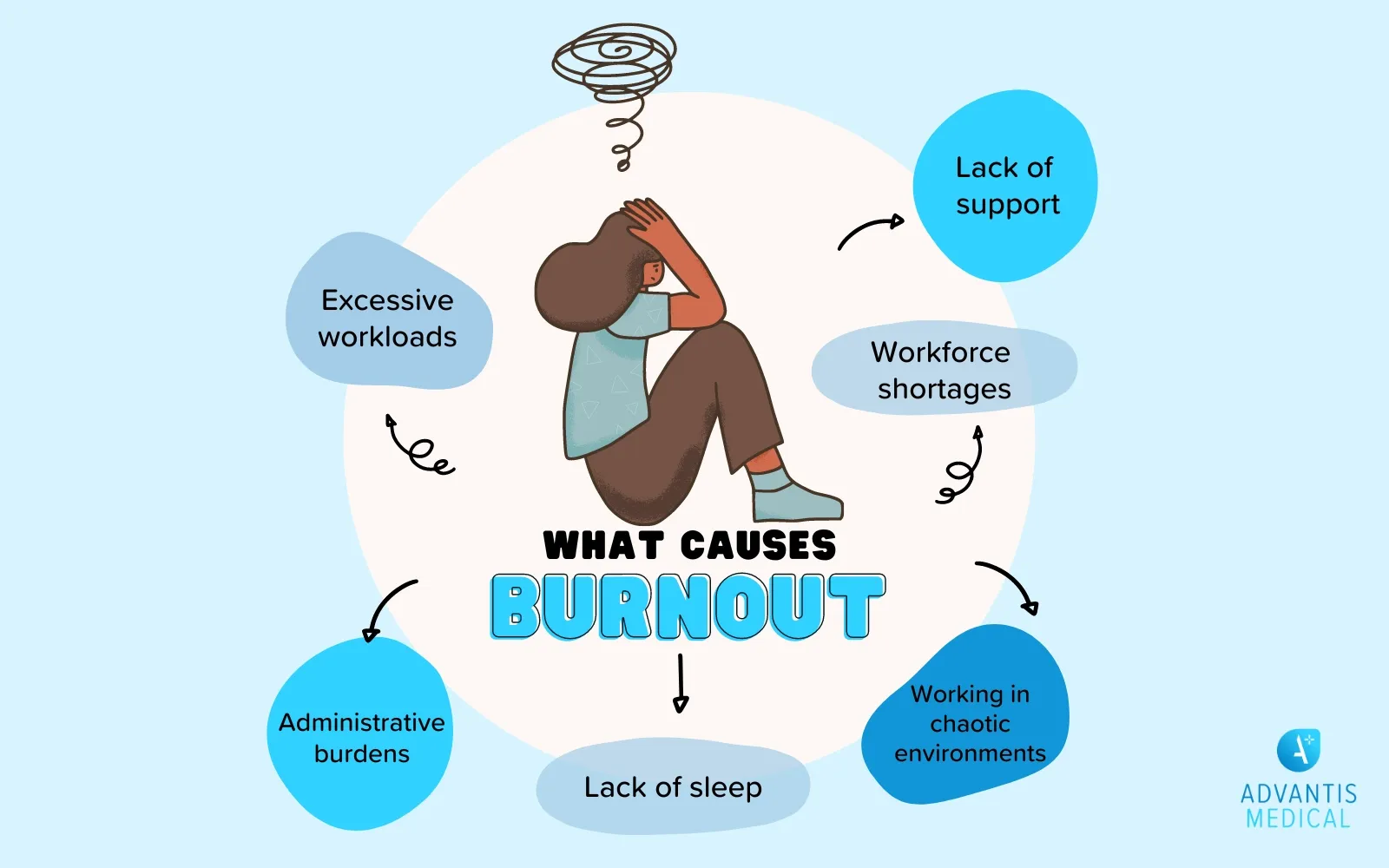Since the height of the pandemic, healthcare burnout has come to the forefront of the public’s attention. However, burnout is not a new problem that healthcare workers face. The problem was just exacerbated and brought into the limelight during the pandemic. The extreme nurse shortage increased the amount of Travel Nursing Jobs available to help alleviate the heavy workload of the nurses during the pandemic and even now. Burnout can happen in any healthcare field, but it is most prominent in high-acuity and high-pressure roles such as NICU nurses. Those taking on NICU Travel Nursing Jobs can feel increased pressure and burnout because they are away from home and caring for tiny warriors.
What Causes Burnout?
Many factors play a role in burnout. They can come from life outside work and most certainly from your working conditions. Some of the most common causes of burnout are as follows:
- Excessive workloads: High patient-to-nurse ratios are one of the leading causes of burnout. Whether you have support staff or not to help with your tasks, there are several things as nurses, you cannot delegate to others. This leaves you with a long list of care items you must complete in 12 hours which we all know isn’t enough time.
- Administrative burdens: Not only are you responsible for the care of several patients, but you have to ensure that you document all the work you do with those patients. Thorough documentation is vital to ensure that the patient gets the best care possible. Still, it can be very challenging to include all the details in the chart when other patients and family members also need you.
- Lack of sleep: Twelve-hour shifts don’t seem like a long time when trying to complete all of your tasks and med passes, but from an energy standpoint, it can be challenging to make it through that long shift. And working twelve hours of your day typically means you are up for several more hours completing your other daily living tasks. And if you work the night shift, you have to try to sleep when the rest of the world is up and at ‘em, which throws your circadian rhythm off. And for those who come in with, “But you only work three days a week, we need the other four to recover from caring for human lives.
- Working in chaotic and high-pressure environments: Working with high-acuity patients often requires closely monitoring several medications and pieces of equipment. This can be stressful and tedious, especially if you have other patients you need to care for. Working with pediatric and neonatal patients not only means you are caring for the patient, but you are also caring for their parents too.
- Workforce shortages: It is no secret that nurses have been understaffed for years, maybe even decades, but due to the mass burnout brought on by the pandemic and the influx of work-from-home options, nurses are now having to do the work of two or three other staff members. These workforce shortages can complicate a task if it is a two- or three-person job with no one to help.
- Lack of scheduling control: Not being in control of your schedule can easily lead to burnout. It isn’t fair to expect full control of your schedule, but you should have some control of what days of the week you work. If you don’t have the proper recovery time after your shifts or are not getting adequate sleep between shifts, your body will not be able to maintain that for long.
- Lack of support: All of the factors mentioned above can lead to burnout, and if you don’t have a supportive manager or employer, it can make matters so much worse. If you lack support in the workplace or feel at risk of being thrown under the bus, it is time for you to spruce up that resume and look elsewhere.

What Does Burnout Look Like?
Signs and symptoms of burnout can be physical, behavioral, and emotional. Everyone experiences burnout differently, and it can be a combination of any of the following:
Physical Signs and Symptoms
- Fatigue
- Change in sleep patterns
- Frequent illnesses
- Frequent head, neck, abdominal, and back pain
- Change in appetite
Emotional Signs and Symptoms
- Decreased life satisfaction
- Sense of failure
- Feeling defeated and helpless
- Lack of motivation
- Self-doubt
- Negative outlook
Behavioral Signs and Symptoms
- Isolating from friends and family
- Angry outbursts
- Substance use
- Procrastination
- Withdrawing from responsibilities
How To Prevent and Treat Burnout
Focusing on your health and well-being is essential to ensure you are the best NICU nurse you can be for your tiny warrior patients. Burnout prevention would ideally be the best outcome, but this is not always the case with increased workloads and high-stress shifts. Don’t fret. Plenty of options exist to prevent and treat burnout if you feel the world’s weight is on your shoulders.
- Recognize and understand symptoms: Knowing what you are looking for is the most crucial step in preventing and treating burnout. Being self-aware can be challenging when you are exhausted and not feeling your best. So check in with yourself often to see if you are experiencing multiple signs or symptoms of burnout.
- Reach out to others: Talking with friends and family can help relieve stress. Working as a travel nurse is stressful and can be lonely, living away from your closest friends and family. Frequent phone calls and video chats can help remedy how you are feeling. If you aren’t living too far from your friends and family, you could plan trips to meet in the middle, so you aren’t going your entire contract time without them.
- Be social with your coworkers: You will honestly spend the most time with your coworkers. It is essential that you build cordial, trusting relationships with them. Additionally, they are the people that you can relate to the most. They will have similar workplace experiences, and having open conversations about the ups and downs of your work can be a great stress reliever, especially with people who understand how you feel.
- Focus on finding balance: This may be one of the most challenging things to focus on when preventing and treating burnout. However, you must find a balance between working, socializing, and relaxing. It may be helpful to schedule yourself time to unwind and relax.
- Set boundaries: Trying to pour from an empty cup is not a sustainable way to live, so don’t be afraid to set boundaries. If you are asked to pick up a shift, and it doesn’t work for your schedule, or you are exhausted, it is ok to say no, regardless of the pressure you feel. The same goes for social gatherings. If you feel like you are forcing yourself to go and you are not looking forward to the event, it is ok to set a boundary and care for yourself.
- Take time off: You are given paid time off and sick time for a reason. You earned it, so use it! It may feel weird to use it, or you may feel guilty if you use it, but it is ok to take time to travel or just have a staycation!
- Try new relaxation techniques: There are numerous options available for relaxation techniques. You can do them in the comfort of your home or participate with your friends. Yoga classes can be a great way to incorporate physical activity into relaxation. There are numerous apps and videos that you can download that guide you through a meditation session. Additionally, you can schedule a massage or facial to help you relax. Whatever you choose, take a deep breath, pull those shoulders away from your ears, and enjoy yourself!
- Sleep: As simple as this may seem, sleep is vital in preventing and treating burnout. Working long hours can negatively affect your sleep schedule, especially when working the second or third shift. These late shifts can throw off your circadian rhythm, increasing your risk of burning out. If you are struggling with sleep, try using a sleep mask, sound machine, or blackout curtains. You should also consider reducing blue light exposure at least an hour before bed. If not contraindicated with your current medication and dietary needs, taking melatonin or tart cherry juice before bed can help you get more rest.
- Prioritize physical activity: Does this mean you must hit the gym every day before or after your shift? Absolutely not! Exercise is one of the healthiest ways to increase your endorphin levels. Try moving your body three to five days a week, whether that means you take a class at a local gym or studio or you walk around your new neighborhood.
- Focus on a healthy diet: Eating a healthy diet can be challenging on a NICU travel nurse’s schedule, especially if you stay in an accommodation with limited kitchen access. Focusing on a perfectly healthy diet 100% can be intimidating and not sustainable. Try focusing on one or two healthy habits like increasing water, getting your daily protein intake, or reducing high-fat snacks and meals.
- Reach out for professional help: You don’t have to wait until you are on the brink of an emotional breakdown to seek professional help. In fact, it would be beneficial to reach out before that point. Professional counseling, psychology, or life coaching services are a great resource to help prevent burnout before it happens. However, if you are at the point of burnout, feel free to contact a trusted professional for help.
If you or anyone you know is suffering from burnout, don’t be afraid to ask for help and focus on caring for yourself. It is crucial that you are at your best so you can offer your best care to your tiny patients! NICU travel nurses work an admirable job caring for high-acuity tiny humans. So, if you feel like that is your calling, check out Advantis Connect to see what opportunities are available!









